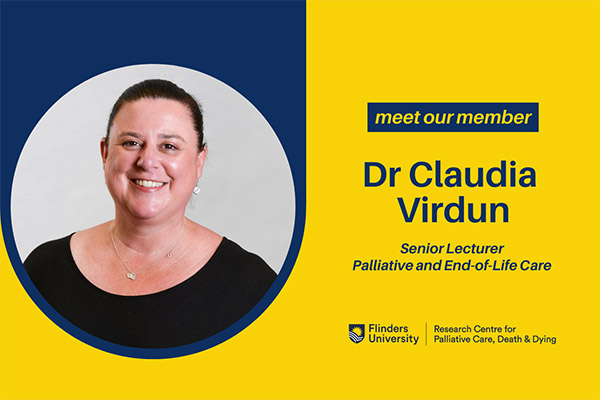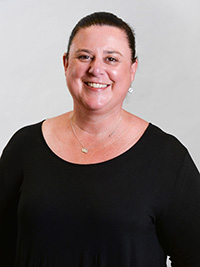
Dr Claudia Virdun is an experienced specialist palliative care nurse, researcher in the area of palliative care and Senior Lecturer – Palliative and End-of-Life Care at Flinders University. RePaDD spoke with Claudia to learn more about her research, what she’s working on and a little about her life outside of research.
What is your main research area and why did it pique your interest?
My main area of research is focused on optimising palliative care within the acute care setting. Throughout my clinical career I have predominantly worked in specialist palliative care within a consultative model, where clinical teams referred to our team for input and advice. This meant I provided care for patients and families across all care settings: community, residential aged care and acute care.
I have worked in both large metropolitan centres (in Australia and England) and rural settings. Throughout this time, I was consistently struck by the diversity of care experiences within the acute care setting. I saw many patients with palliative care needs very late in their illness and often within days of their death.
I saw excellent care experiences, but I also saw care experiences that were fragmented and that did not enable patients and families the best care that we know is possible. This concerned me and I wanted to better understand why inpatient palliative care was so variable. I have therefore focused my research on this area, starting with my doctoral program of research and continuing in my postdoctoral work within my current role.
What are you currently working on and how do you envision it helping improve palliative and end-of-life care?
I am currently working on understanding how to drive improved palliative care at the ward level within acute hospitals. I am trying to understand what measurement methods may help clinical teams and what facilitation support is needed to support innovation and sustained change.
My current study is using a brief Patient Reported Experience Measure (PREM) and feeding this data back to a core clinical team (working group) who meet regularly to review the data. We ask two questions of the data: what makes us proud and what makes us uncomfortable?
I then support the working group to think about how they could improve the area that is making them uncomfortable (informed by the patient voice via the PREM data) and facilitate testing ideas for change on the ward.
What are the next steps in terms of rolling out and further collaboration?
I need to better understand the key areas that have been most helpful in improving patient experience to inform a broader rollout of ideas. I would love to be able to provide a brief resource for Nursing Unit Managers that provides a few key ideas that can support their leadership of excellence in palliative and end-of-life care on their wards.
Further collaboration with acute care and specialist palliative care colleagues will be critical in ensuring this work is based on what matters for patients and tailored to the unique context of acute care. I think we are understanding this space in much greater depth and I am excited for the next few years as we continue to progress this work.
Which one of your publications/projects is most important to you and why did it excite you?
I think I would have to say two projects have been most important for me thus far within my research career.
The first relates to my doctoral project: Optimising care for People with palliative care needs, and their families, in the Australian hospital setting: the OPAL Project. My PhD has been core to developing understanding about the complexity of the hospital setting and particularly influenced the critical nature of listening to patients, families, carers and consumer representatives in relation to all work achieved.
My PhD required me to try to remove my nurse ‘hat’ or bias and start to think about the voice of patients with palliative care needs and their families. This was critical – and indeed powerful – and continues to influence my work today.
The second project is one I am finalising right now (data analysis is underway) and relates to working with three wards in a large tertiary hospital to understand the impact of PREM collection and feedback, alongside facilitation support, to enable improved palliative care experience. I have learnt huge amounts and really enjoyed working with clinical teams to understand their needs in supporting improved palliative care across the system. I look forward to completing the data analysis to inform our study outcomes and recommendations in coming months.
Outside of research, how do you like to spend your spare time?
Outside of research, my time is pretty focused on all things related to my daughter, who is 8 years old. That generally includes swimming, netball, Monopoly Deal and we are currently practising a piano duet of If I Only Had a Brain from The Wizard of Oz – perhaps that title tells me something 😊


